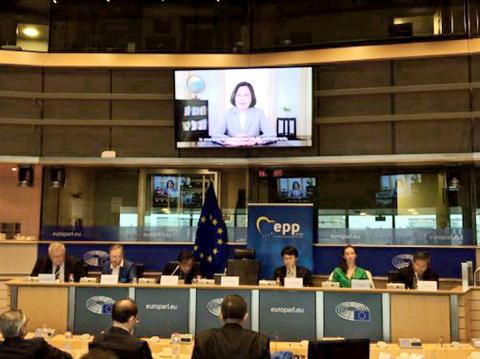President Tsai Ing-wen (蔡英文) on Monday urged European nations to support liberal, democratic Taiwan at a time when a rising China is affecting the global landscape.
In a recorded speech at a seminar held at the European Parliament in Brussels, Tsai said China is undermining the “status quo” across the Taiwan Strait and its rapid rise is changing the global order in place since the end of World War II.
At the opening of the Taiwan-sponsored seminar titled “China Factor: Resistance is Futile? — Taiwan as a Case Study,” Tsai said in a video that Taiwan is aware of the challenges posed by China and that its actions have “not served to drive Taiwan to Beijing, but encouraged us to look at where our friends and partners are, in countries that share our values and interests.”

Photo: CNA
Since 2016, China has stepped up its pressure on democratic Taiwan and tried hard to squeeze its economy and international space, Tsai said.
China has been working to destabilize Taiwan and undermine Taiwanese trust in the nation’s democratic institutions, she said.
However, China’s actions have only strengthened Taiwan’s resolve that freedom and democracy, not fear, would continue to determine the future of the nation’s 23 million people, she said.
“At this critical juncture in human history, Taiwan understands, better than any country in the world, how important it is that those values survive,” Tsai said. “As a small democracy trying to engage with the world’s most powerful non-democratic country, Taiwan is resilient and determined to safeguard our precious democracy.”
However, these challenges are not for Taiwan alone and the nation is seeking support from friends and partners that share the same values, she said.
“We do need your support. A liberal democratic order can only survive if like-minded countries, including our European partners, work together for the greater good,” she said. “I’m calling on all like-minded countries to display the same spirit that led to the founding of a union across Europe in 1951: the clear-eyed sense that only by coming together can we protect our values and our future,” she said.
The speech, which lasted about 4 minutes, 30 seconds, received plenty of applause from the audience at the seminar, which was hosted by the European Federation of Taiwanese Associations.
In response to Tsai’s speech, Ivan Stefanec, a Slovak member of the European Parliament, said the EU and Taiwan have forged close ties and that the union should pay more attention to democratic development in Taiwan and Asia.
He called for more exchanges between Taiwan and the EU in economics, education and culture.
Stefanec, who has visited Taiwan several times and is familiar with cross-strait relations, said China’s rise is a very important issue not only in global economics, but also in international politics, so the EU needs to keep an eye on the latest developments.

‘WIN-WIN’: The Philippines, and central and eastern European countries are important potential drone cooperation partners, Minister of Foreign Affairs Lin Chia-lung said Minister of Foreign Affairs Lin Chia-lung (林佳龍) in an interview published yesterday confirmed that there are joint ventures between Taiwan and Poland in the drone industry. Lin made the remark in an exclusive interview with the Chinese-language Liberty Times (the Taipei Times’ sister paper). The government-backed Taiwan Excellence Drone International Business Opportunities Alliance and the Polish Chamber of Unmanned Systems on Wednesday last week signed a memorandum of understanding in Poland to develop a “non-China” supply chain for drones and work together on key technologies. Asked if Taiwan prioritized Poland among central and eastern European countries in drone collaboration, Lin

The Chien Feng IV (勁蜂, Mighty Hornet) loitering munition is on track to enter flight tests next month in connection with potential adoption by Taiwanese and US armed forces, a government source said yesterday. The kamikaze drone, which boasts a range of 1,000km, debuted at the Taipei Aerospace and Defense Technology Exhibition in September, the official said on condition of anonymity. The Chungshan Institute of Science and Technology and US-based Kratos Defense jointly developed the platform by leveraging the engine and airframe of the latter’s MQM-178 Firejet target drone, they said. The uncrewed aerial vehicle is designed to utilize an artificial intelligence computer

Renewed border fighting between Thailand and Cambodia showed no signs of abating yesterday, leaving hundreds of thousands of displaced people in both countries living in strained conditions as more flooded into temporary shelters. Reporters on the Thai side of the border heard sounds of outgoing, indirect fire yesterday. About 400,000 people have been evacuated from affected areas in Thailand and about 700 schools closed while fighting was ongoing in four border provinces, said Thai Rear Admiral Surasant Kongsiri, a spokesman for the military. Cambodia evacuated more than 127,000 villagers and closed hundreds of schools, the Thai Ministry of Defense said. Thailand’s military announced that

CABINET APPROVAL: People seeking assisted reproduction must be assessed to determine whether they would be adequate parents, the planned changes say Proposed amendments to the Assisted Reproduction Act (人工生殖法) advanced yesterday by the Executive Yuan would grant married lesbian couples and single women access to legal assisted reproductive services. The proposed revisions are “based on the fundamental principle of respecting women’s reproductive autonomy,” Cabinet spokesperson Michelle Lee (李慧芝) quoted Vice Premier Cheng Li-chiun (鄭麗君), who presided over a Cabinet meeting earlier yesterday, as saying at the briefing. The draft amendment would be submitted to the legislature for review. The Ministry of Health and Welfare, which proposed the amendments, said that experts on children’s rights, gender equality, law and medicine attended cross-disciplinary meetings, adding that